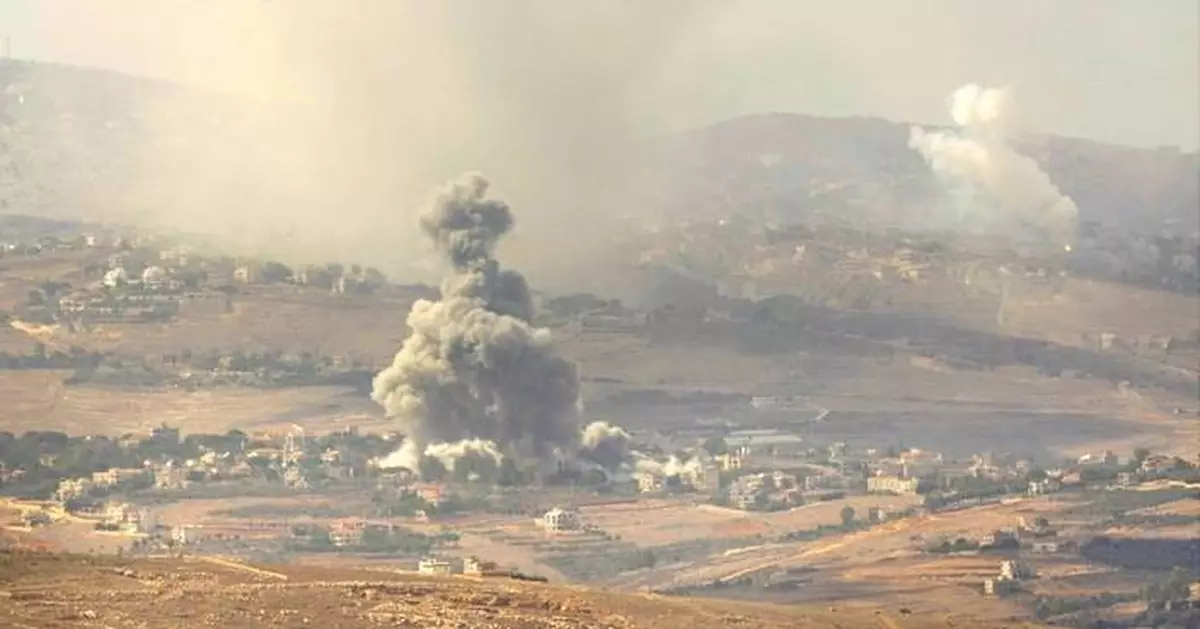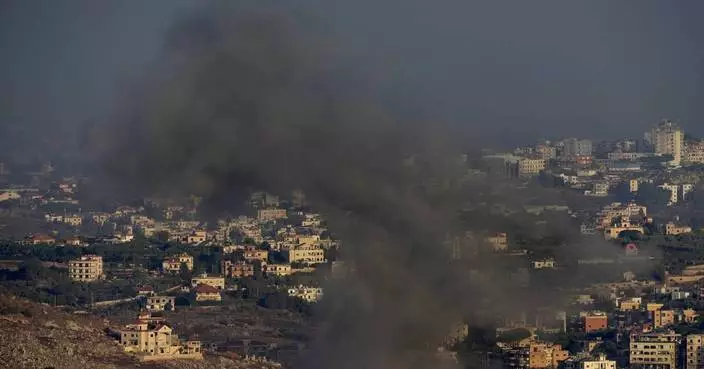Israel is bombing targets across many parts of Lebanon, striking senior militants in Beirut and apparently hiding bombs in pagers and walkie-talkies. Hezbollah is firing rockets and drones deep into northern Israel, setting buildings and cars alight.
But no one is calling it a war — not yet.
Israeli officials say they are not seeking war with Hezbollah and that it can be avoided if the militant group halts its attacks and backs away from the border. Hezbollah also says it doesn't want a war but is prepared for one — and that it will keep up the strikes on Israel that it began in the wake of ally Hamas' Oct. 7 attack until there is a cease-fire in Gaza.
Israel and Hezbollah have repeatedly traded fire since then — but the intensity rose to another level Monday, when Israeli airstrikes killed more than 270 people, according to Lebanese officials. That would make it the deadliest day in Lebanon since Israel and Hezbollah last went to war in 2006.
“If someone had told me or most analysts in summer 2023 that Hezbollah is striking Israeli bases in Israel, and Israel is striking southern Lebanon and parts of southern Beirut, I would have said, okay, that’s an all-out war," said Andreas Krieg, a military analyst at King’s College London.
The term hasn't yet been applied to the current conflict because “there haven’t been any boots on the ground," but that might be “the wrong metric," he added.
Merriam-Webster defines war as “a state of usually open and declared armed hostile conflict between states or nations.” Scholars generally expand that definition to cover large-scale violence involving insurgents, militias and extremist groups.
But any attempt at greater precision is difficult since armed conflicts run the gamut from states clashing with tanks and fighter jets to lower-level fighting.
Sometimes states officially declare war, as Israel did after Hamas' attack last year.
It has not made a similar declaration with regard to Hezbollah, but it has linked its strikes against the group to the war in Gaza, saying last week that allowing tens of thousands of residents to safely return to the north is an objective in that conflict. Israel’s defense minister, Yoav Gallant, also frequently talks about an ongoing war with Iran and its allies along “seven fronts,” including Lebanon.
States often refrain from declaring war even when they are plainly engaged in one. Russia officially refers to its invasion of Ukraine as a “special military operation” and has banned public references to it as a war. The United States has not formally declared war since World War II, even as it took part in major conflicts in Korea, Vietnam, Iraq and Afghanistan.
Part of the reason neither Israel nor Hezbollah is using the word “war” is because they both hope to achieve their aims without setting off a more severe conflict — or being blamed for one.
“Though tensions are flaring, the situation in southern Lebanon is not that of a full-scale war as both Hezbollah and Israel hope to use limited means to pressure one another,” said Lina Khatib, a Middle East expert at Chatham House.
With its rocket and drone attacks, Hezbollah hopes to pressure Israel to agree to a cease-fire with Hamas — a fellow Iran-backed militant group — and to avoid being seen as bowing to Israeli pressure.
Hezbollah has said it would cease the attacks if there were a truce in Gaza, but the prospects for such a deal appear remote.
Israeli Prime Minister Benjamin Netanyahu has vowed to do whatever is necessary to halt the attacks so that displaced Israelis can return to their homes.
“I think the Israelis are trying to either tell Hezbollah, you come to the negotiation table and we’ll settle this through diplomacy, or we’ll push you into a corner until you overreact," Krieg said. “And that will be the all-out war.”
Until recently, experts generally agreed that any future war between Israel and Hezbollah would look like the war they fought in 2006 — but much, much worse.
For years, Israeli officials warned that in any future war with Hezbollah, the army would exact a punishing toll on Lebanon itself, destroying critical infrastructure and flattening Hezbollah strongholds. It came to be known as the Dahiyeh Doctrine, named for the crowded southern Beirut district where the militant group is headquartered, and that suffered heavy destruction in 2006.
Hezbollah, meanwhile, spent years expanding and improving its arsenal, and is believed to have some 150,000 rockets and missiles capable of hitting all parts of Israel.
The military build-up and threats created a situation of mutual deterrence that kept the border largely quiet from 2006 until October of last year. For most of the past year, the region has been braced for the worst, but both sides have showed restraint, and the talk of “all-out war” has been hypothetical.
That could change at any time.
“We’ve gone up a step, but we haven’t yet made it to the penthouse floor,” said Uzi Rabi, the director of the Moshe Dayan Center for Middle Eastern and African Studies at Tel Aviv University. “At the end, I don’t see there’s going to be any alternative to a ground operation.”
Any Israeli decision to send tanks and troops into southern Lebanon would mark a major escalation and lead many to categorize the conflict as a war. But the two don't necessarily always go hand in hand.
Israel officially declared war in Gaza nearly three weeks before it sent any ground troops in. Israeli ground forces have been operating in the occupied West Bank for decades, and in recent months have routinely launched airstrikes against militants, without anyone suggesting it's a war.
A limited Israeli ground incursion might still leave room for both sides to back down.
Of course, Lebanon would likely see a ground invasion as a blatant violation of its sovereignty and an act of war. But Beirut already accuses Israel of routinely violating its airspace and of occupying disputed territory along the border.
In fact, the two countries are already officially in a state of war, and have been since 1948.
Associated Press writers Abby Sewell and Kareem Chehayeb in Beirut, and Melanie Lidman in Jerusalem contributed.
Follow AP’s war coverage at https://apnews.com/hub/israel-hamas-war
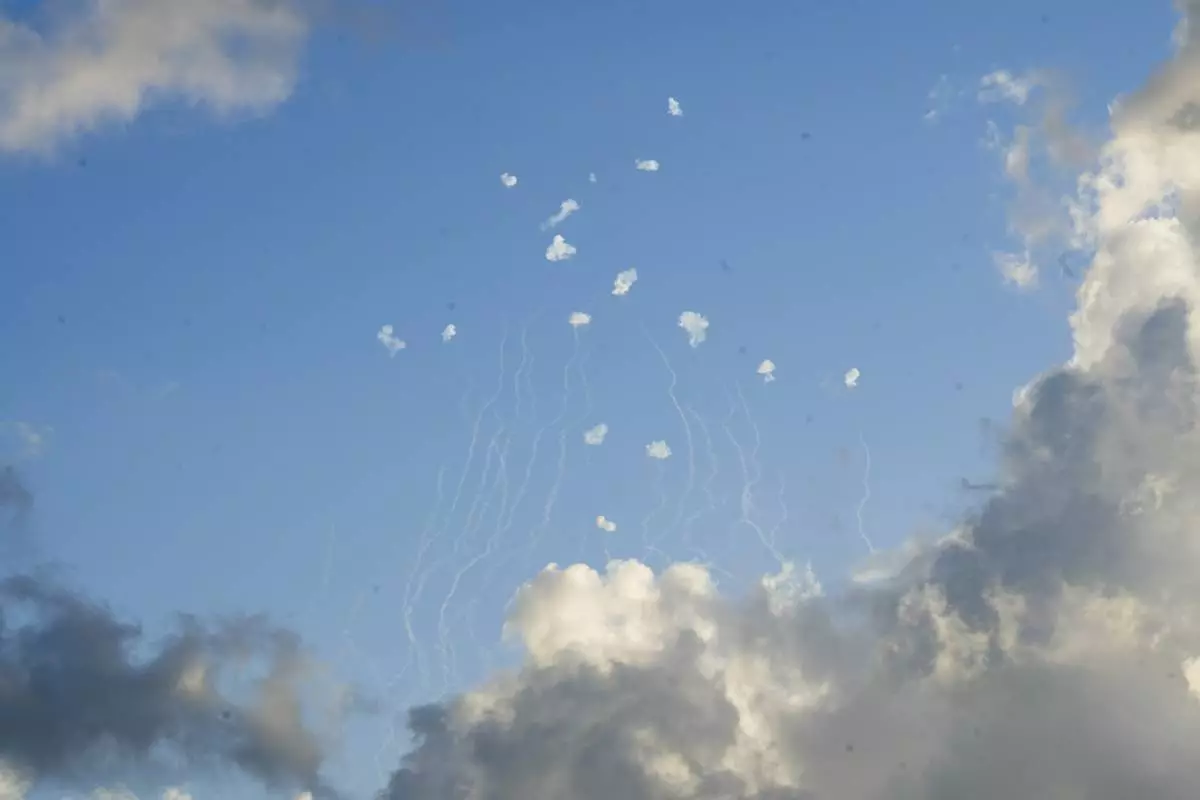
Israeli Iron Dome air defense system fires to intercept rockets that were launched from Lebanon, in northern Israel, Sunday, Sept. 22, 2024. (AP Photo/Baz Ratner)
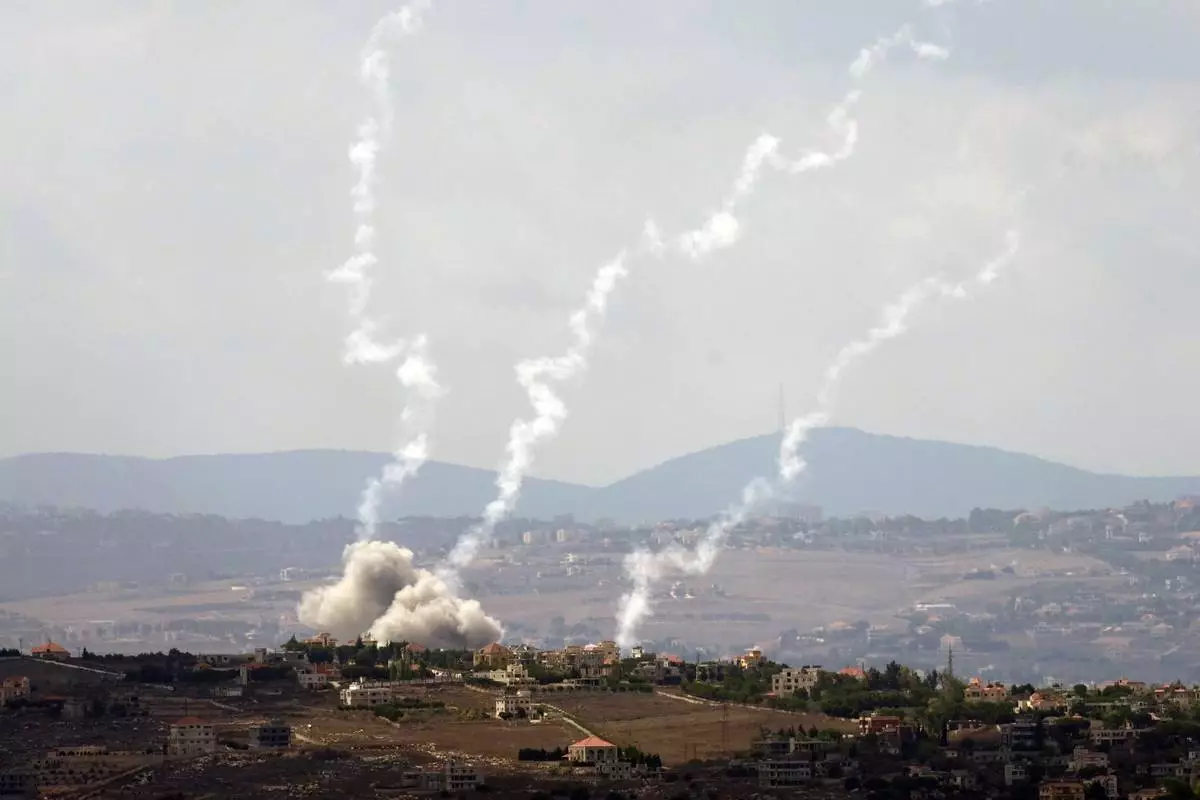
Smoke rises from Israeli airstrikes on Taybeh village, seen from the southern town of Marjayoun, Lebanon, Monday, Sept. 23, 2024. (AP Photo/Hussein Malla)
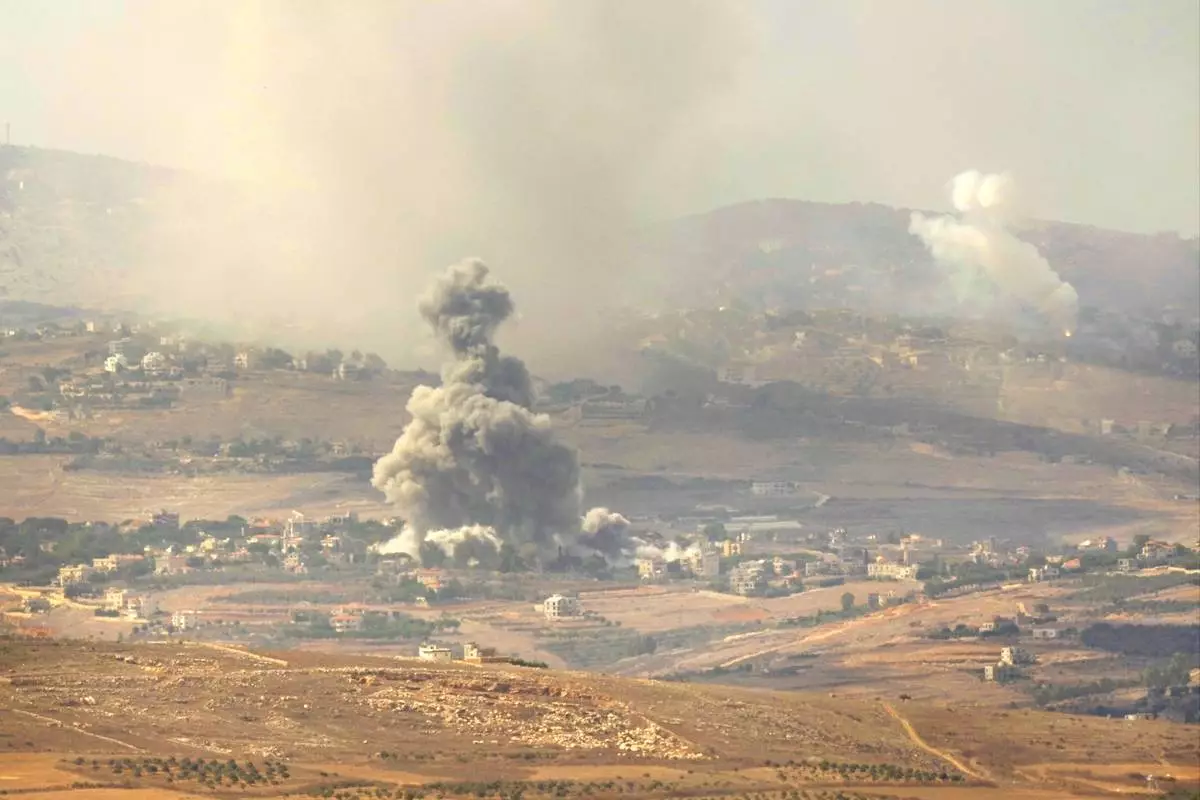
Smoke rises from Israeli airstrikes on villages in the Nabatiyeh district, seen from the southern town of Marjayoun, Lebanon, Monday, Sept. 23, 2024. (AP Photo/Hussein Malla)
MARJAYOUN, Lebanon (AP) — Israeli strikes on Monday killed more than 270 Lebanese in the deadliest barrage since the 2006 Israel-Hezbollah war as the Israeli military warned residents in southern and eastern Lebanon to evacuate their homes ahead of a widening air campaign against Hezbollah.
Thousands of Lebanese fled the south, and the main highway out of the southern port city of Sidon was jammed with cars heading toward Beirut in the biggest exodus since the 2006 fighting. More than 1,000 other people were wounded in the strikes — a staggering one-day toll for a country still reeling from a deadly attack on communication devices last week.
Lebanese Health Minister Firass Abiad told a news conference in Beirut that the strikes hit hospitals, medical centers and ambulances. The government ordered schools and universities to close across most of the country and began preparing shelters for people displaced from the south.
The Israeli military announced that it hit some 800 targets, saying it was going after Hezbollah weapons sites. Some strikes hit in residential areas of towns in the south and the eastern Bekaa Valley. One strike hit a wooded area as far away as Byblos in central Lebanon, more than 80 miles from the border north of Beirut.
The military said it was expanding the airstrikes to include areas of the valley along Lebanon’s eastern border with Syria. Hezbollah has long had an established presence in the valley, and it is where the group was founded in 1982 with the help of Iran’s Revolutionary Guards.
Israeli military spokesman Rear Adm. Daniel Hagari repeated warnings urging residents to immediately evacuate areas where Hezbollah is storing weapons, including in the valley. The warnings left open the possibility that some residents could live in or near targeted structures without knowing that they are risk.
Meanwhile, Hezbollah said in a statement that it fired dozens of rockets toward Israel, including at an military post in Galilee. It also targeted for a second day the facilities of the Rafael defense firm, headquartered in Haifa.
As Israel carried out the attacks, Israeli authorities reported a series of air-raid sirens in northern Israel warning of incoming rocket fire from Lebanon.
The evacuation warnings were the first of their kind in nearly a year of steadily escalating conflict and came after a particularly heavy exchange of fire on Sunday. Hezbollah launched around 150 rockets, missiles and drones into northern Israel in retaliation for strikes that killed a top commander and dozens of fighters.
The increasing strikes and counterstrikes have raised fears of an all-out war, even as Israel is still battling Hamas in Gaza and trying to return scores of hostages taken in Hamas' Oct. 7 attack. Hezbollah has vowed to continue its strikes in solidarity with the Palestinians and Hamas, a fellow Iran-backed militant group. Israel says it is committed to returning calm to its northern border.
Associated Press journalists in southern Lebanon reported heavy airstrikes targeting many areas Monday morning, including some far from the border.
Lebanon's state-run National News Agency said the strikes hit a forested area in the central province of Byblos, about 130 kilometers (81 miles) north of the Israeli-Lebanese border, for the first time since the exchanges began in October.
Israel also bombed targets in the northeastern Baalbek and Hermel regions, where a shepherd was killed and two family members were wounded, according to the news agency. It said a total of 30 people were wounded in strikes.
The Lebanese Health Ministry put the death toll at 274. It asked hospitals in southern Lebanon and the eastern Bekaa Valley to postpone surgeries that could be done later. The ministry said in a statement that its request aimed to keep hospitals ready to deal with people wounded by “Israel’s expanding aggression on Lebanon.”
An Israeli military official said Israel is focused on aerial operations and has no immediate plans for a ground operation. The official, speaking on condition of anonymity in keeping with regulations, said the strikes are aimed at curbing Hezbollah's ability to launch more strikes into Israel.
Lebanese media reported that residents received text messages urging them to move away from any building where Hezbollah stores arms until further notice.
“If you are in a building housing weapons for Hezbollah, move away from the village until further notice,” the Arabic message reads, according to Lebanese media.
Lebanon's information minister, Ziad Makary, said in a statement that his office in Beirut had received a recorded message telling people to leave the building.
“This comes in the framework of the psychological war implemented by the enemy,” Makary said, and urged people “not to give the matter more attention than it deserves.”
It was not immediately clear how many people would be affected by the Israeli orders. Communities on both sides of the border have largely emptied out because of the near-daily exchanges of fire.
Israel has accused Hezbollah of transforming entire communities in the south into militant bases, with hidden rocket launchers and other infrastructure. That could lead the Israeli military to wage an especially heavy bombing campaign, even if no ground forces move in.
The military said it had targeted more than 150 militant sites early Monday. Residents of different villages in southern Lebanon posted photos on social media of airstrikes and large plumes of smoke. The state-run National News Agency also reported airstrikes on different areas.
An Israeli airstrike on a Beirut suburb on Friday killed a top Hezbollah military commander and more than a dozen fighters, as well as dozens of civilians, including women and children.
Last week, thousands of communications devices, used mainly by Hezbollah members, exploded in different parts of Lebanon, killing 39 people and wounding nearly 3,000. Lebanon blamed Israel for the attacks, but Israel did not confirm or deny any responsibility.
Hezbollah began firing into Israel a day after the Oct. 7 attack in what it said was an attempt to pin down Israeli forces to help Palestinian fighters in Gaza. Israel has retaliated with airstrikes, and the conflict has steadily intensified over the past year.
The fighting has killed hundreds of people in Lebanon, dozens in Israel and displaced tens of thousands on both sides of the border. It has also sparked brush fires that have destroyed agriculture and scarred the landscape.
Israel has vowed to push Hezbollah back from the border so its citizens can return to their homes, saying it prefers to do so diplomatically but is willing to use force. Hezbollah has said it will keep up its attacks until there is a cease-fire in Gaza, but that appears increasingly elusive as the war nears its anniversary.
Hamas-led militants stormed into southern Israel on Oct. 7, killing some 1,200 people, mostly civilians, and abducting around 250. Some 100 captives are still held in Gaza, a third of whom are believed to be dead, after most of the rest were released during a weeklong cease-fire in November.
Israel's offensive has killed over 41,000 Palestinians, according to the Gaza Health Ministry, which does not differentiate between civilians and fighters in its count. It says women and children make up a little over half of those killed. Israel says it has killed over 17,000 militants, without providing evidence.
Lidman reported from Jerusalem, and Mroue reported from Beirut. Associated Press writer Abby Sewell in Beirut contributed to this report.
Follow AP’s war coverage at https://apnews.com/hub/israel-hamas-war
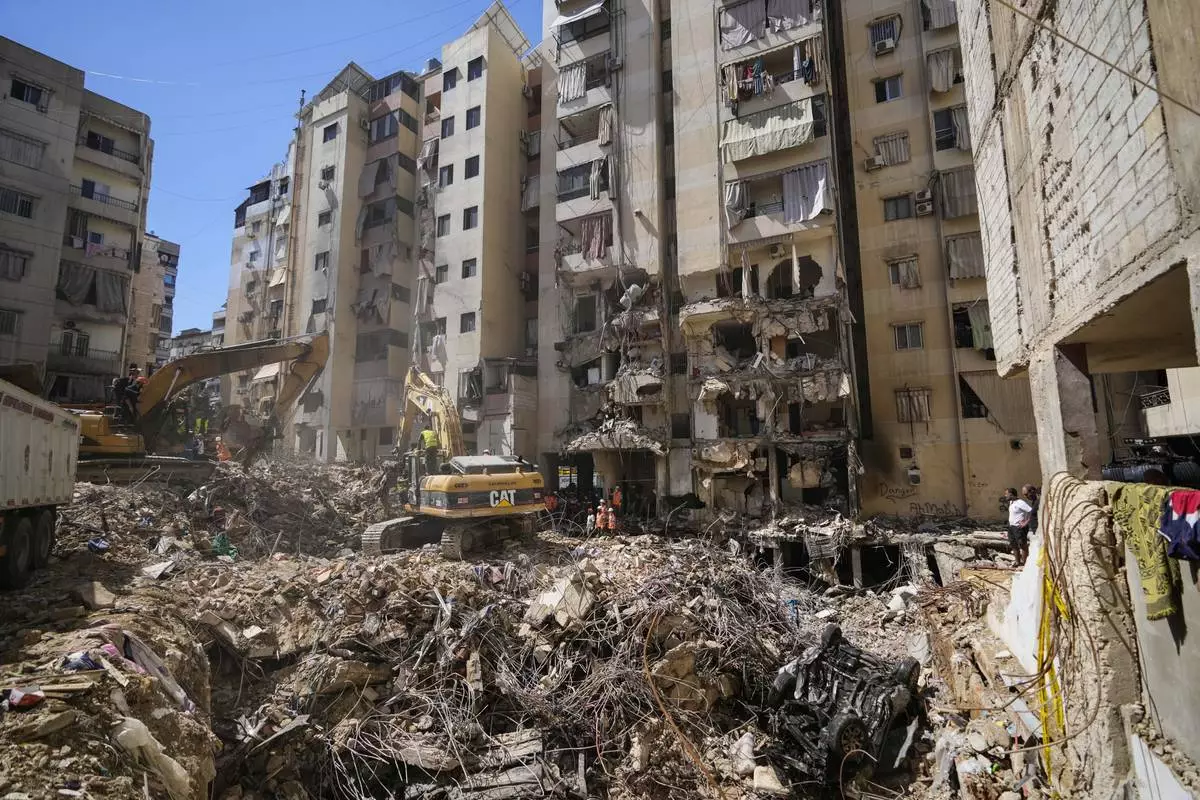
Emergency workers use excavators to clear the rubble at the site of Friday's Israeli strike in Beirut's southern suburbs, Lebanon, Monday, Sept. 23, 2024. (AP Photo/Hassan Ammar)
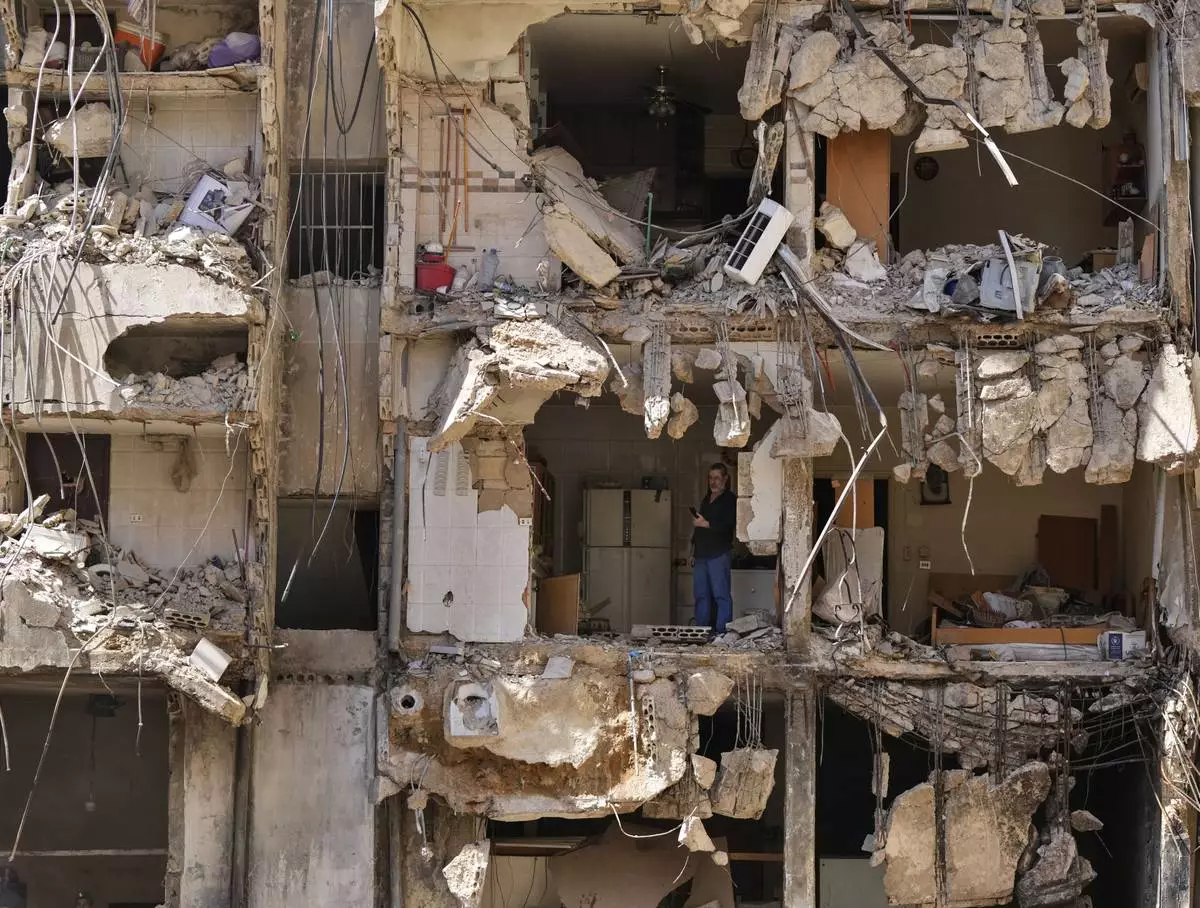
A man watches rescuers sift through the rubble as they search for people still missing at the site of Friday's Israeli strike in Beirut's southern suburbs, Monday, Sept. 23, 2024. (AP Photo/Hassan Ammar)
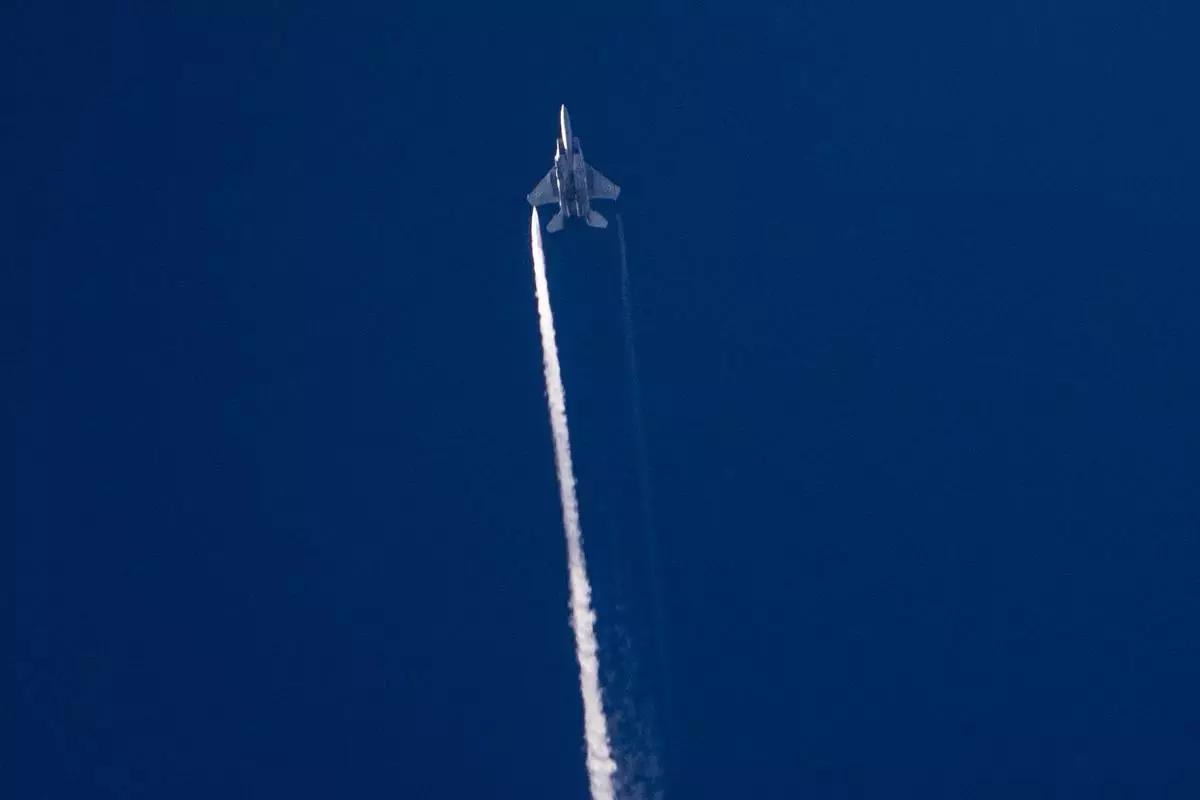
An armed Israeli fighter jet is seen from Hadera as it crosses towards northern Israel, on Monday, Sept. 23, 2024. (AP Photo/Ariel Schalit)
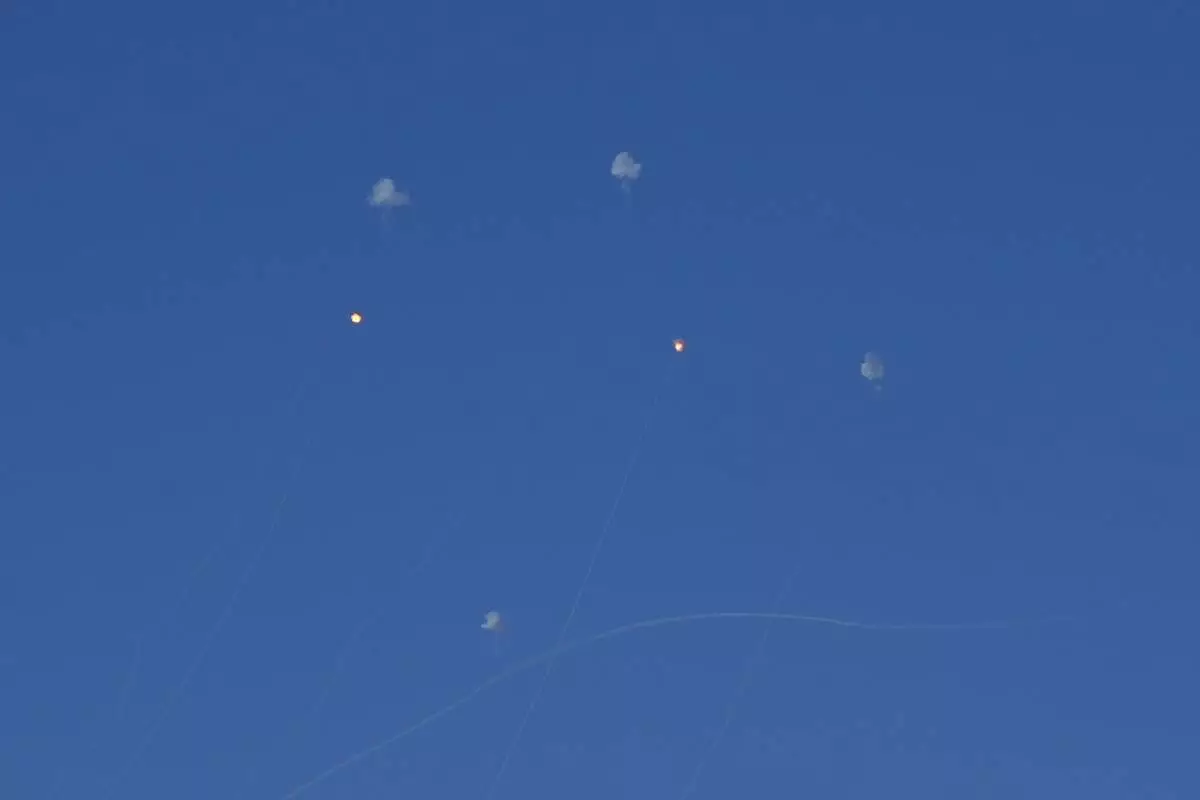
Israeli Iron Dome air defense system fires to intercept rockets that were launched from Lebanon, in northern Israel, Monday, Sept. 23, 2024. (AP Photo/Baz Ratner)
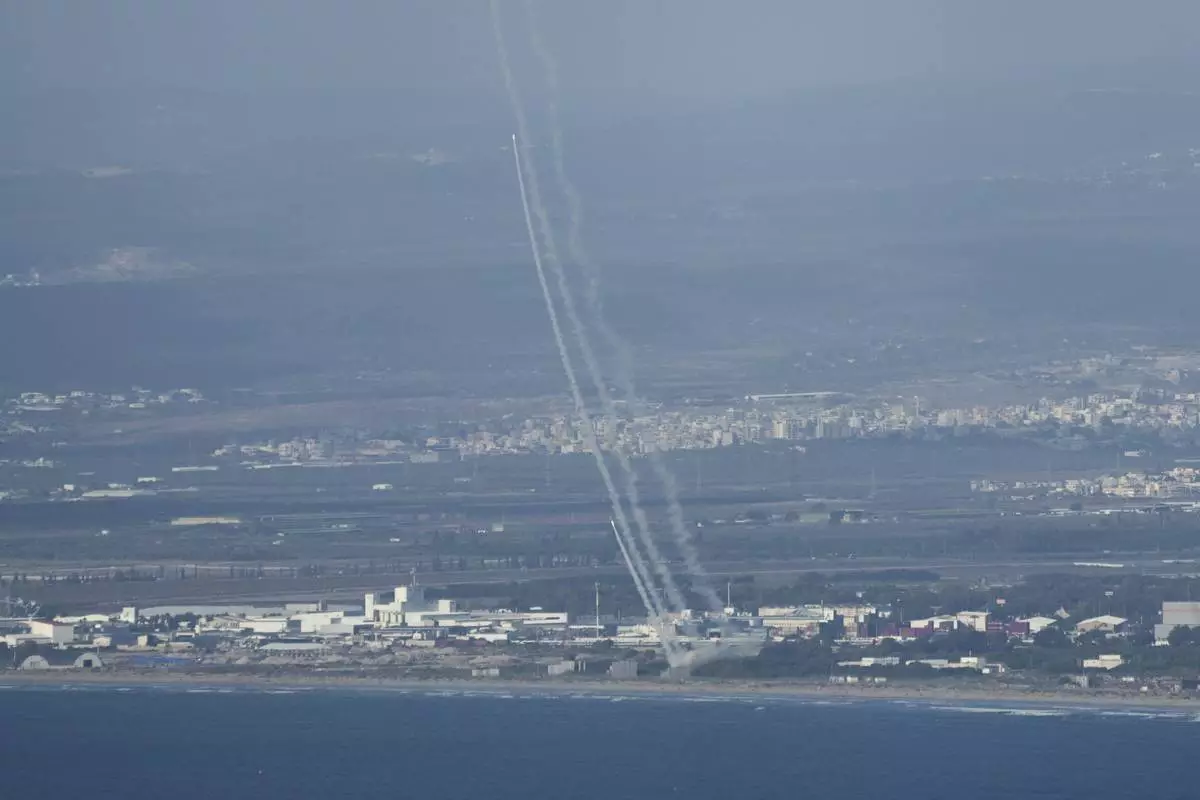
Israeli Iron Dome air defense system fires to intercept rockets that were launched from Lebanon, in northern Israel, Monday, Sept. 23, 2024. (AP Photo/Ohad Zwigenberg)
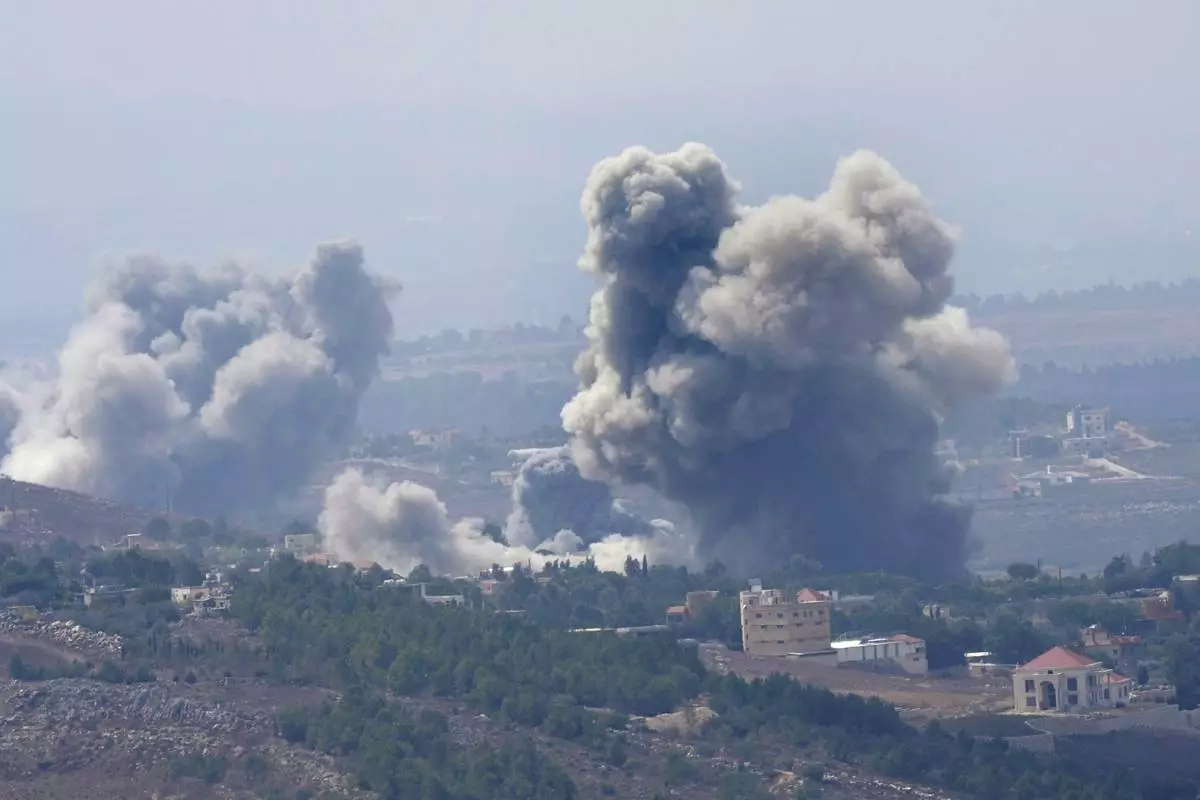
Smoke rises from Israeli airstrikes on villages in the Nabatiyeh district, seen from the southern town of Marjayoun, Lebanon, Monday, Sept. 23, 2024. (AP Photo/Hussein Malla)
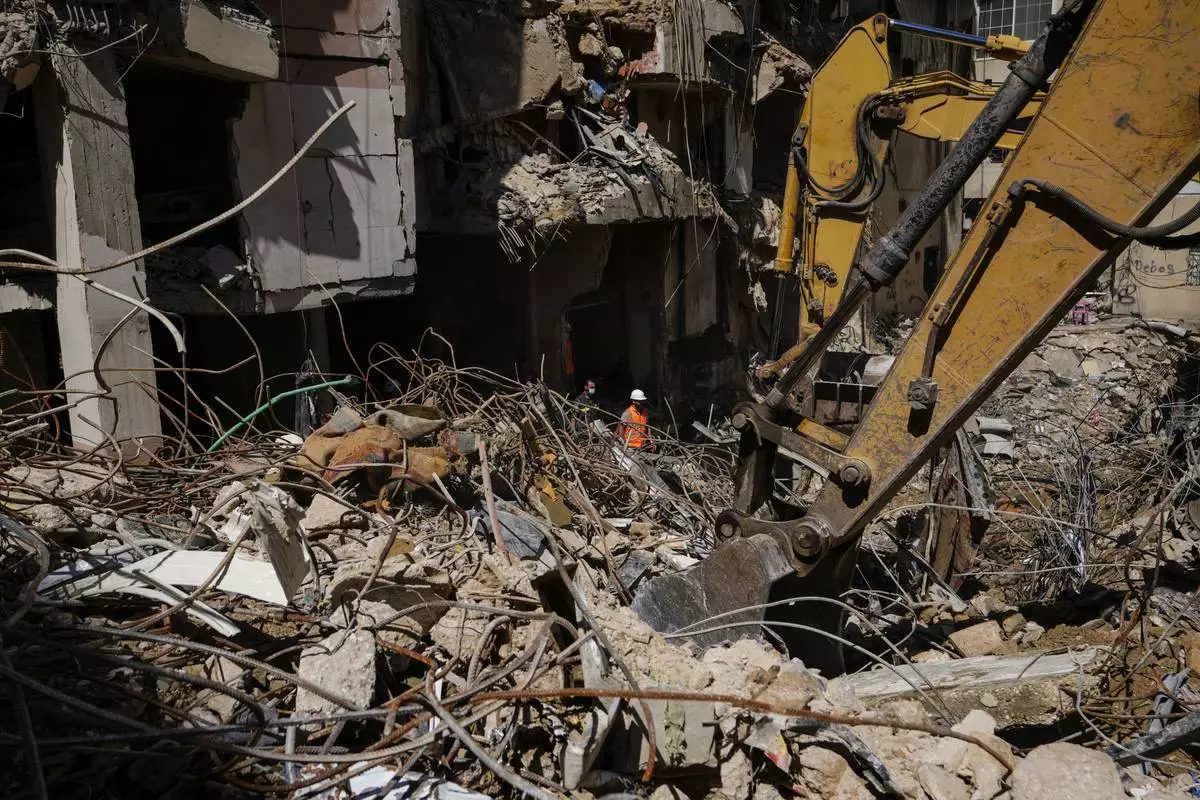
Rescuers sift through the rubble as they search for people still missing at the site of Friday's Israeli strike in Beirut's southern suburbs, Monday, Sept. 23, 2024. (AP Photo/Hassan Ammar)
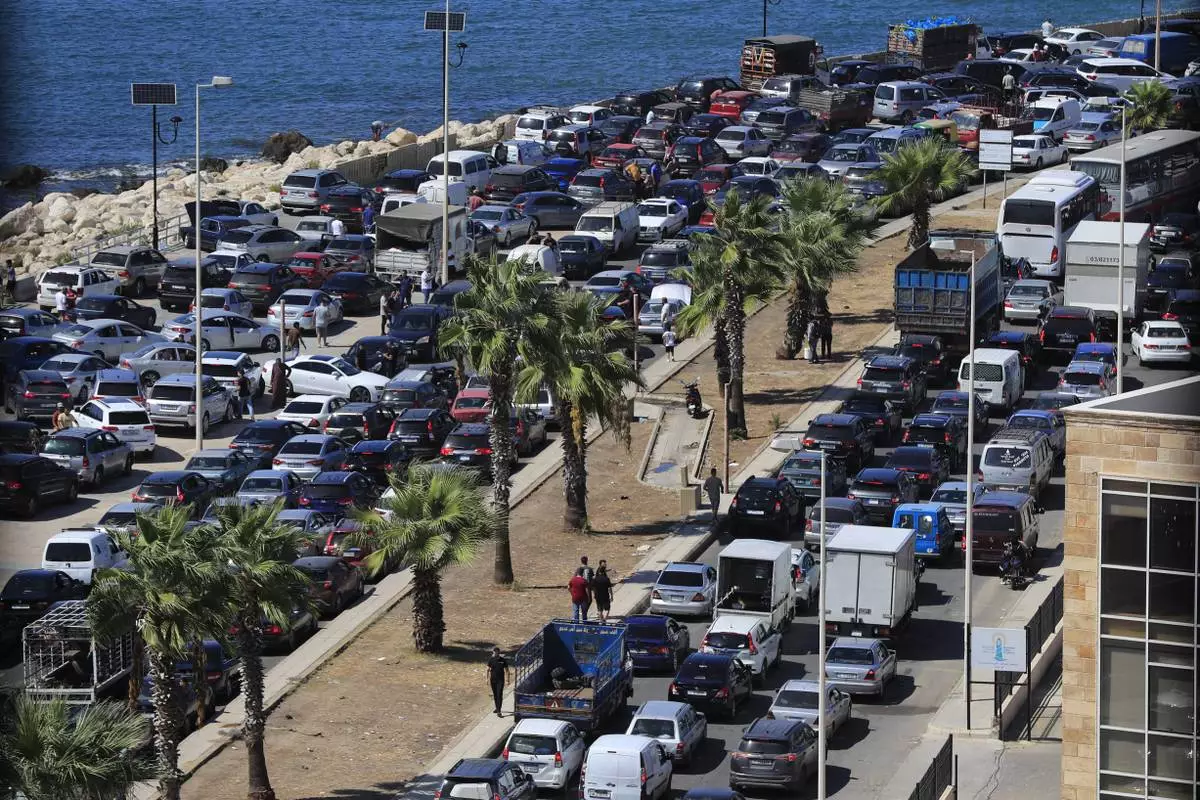
Cars sit in traffic as people flee the southern villages amid ongoing Israeli airstrikes, in Sidon, Lebanon, Monday, Sept. 23, 2024. (AP Photo/Mohammed Zaatari)
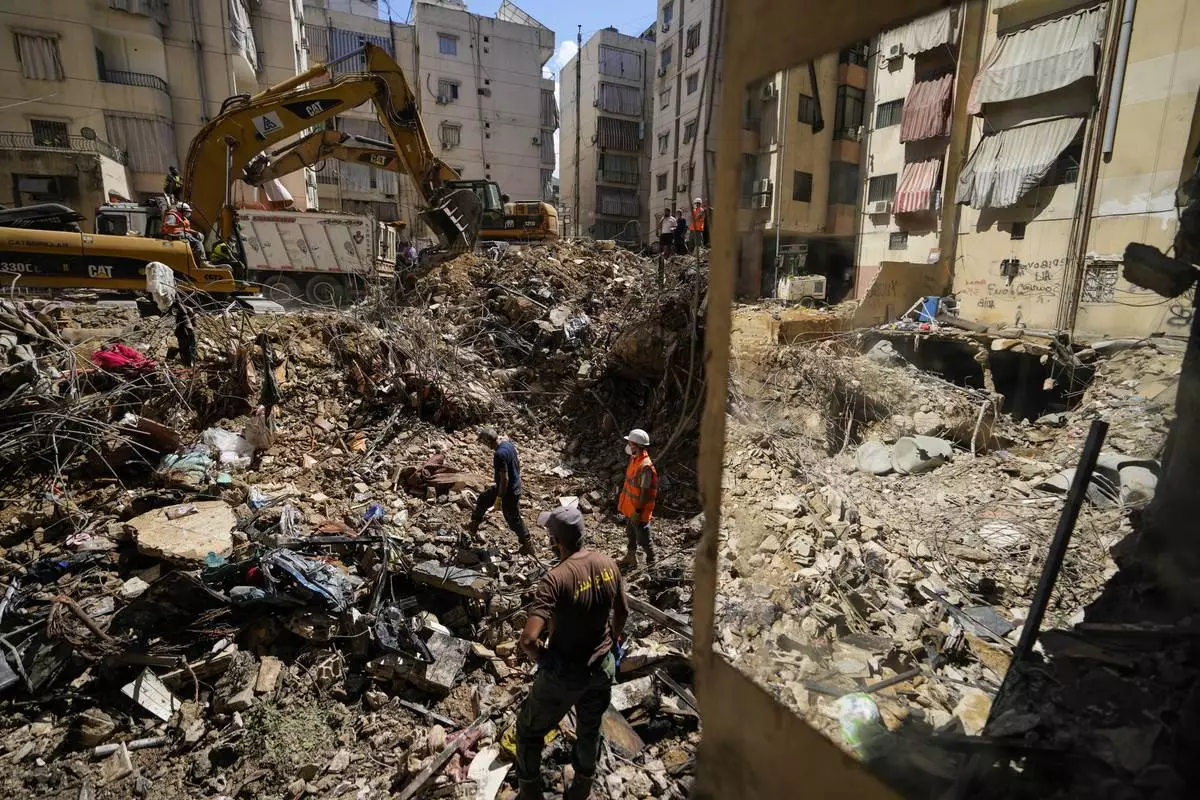
Emergency workers use excavators to clear the rubble at the site of Friday's Israeli strike in Beirut's southern suburbs, Lebanon, Monday, Sept. 23, 2024. (AP Photo/Hassan Ammar)
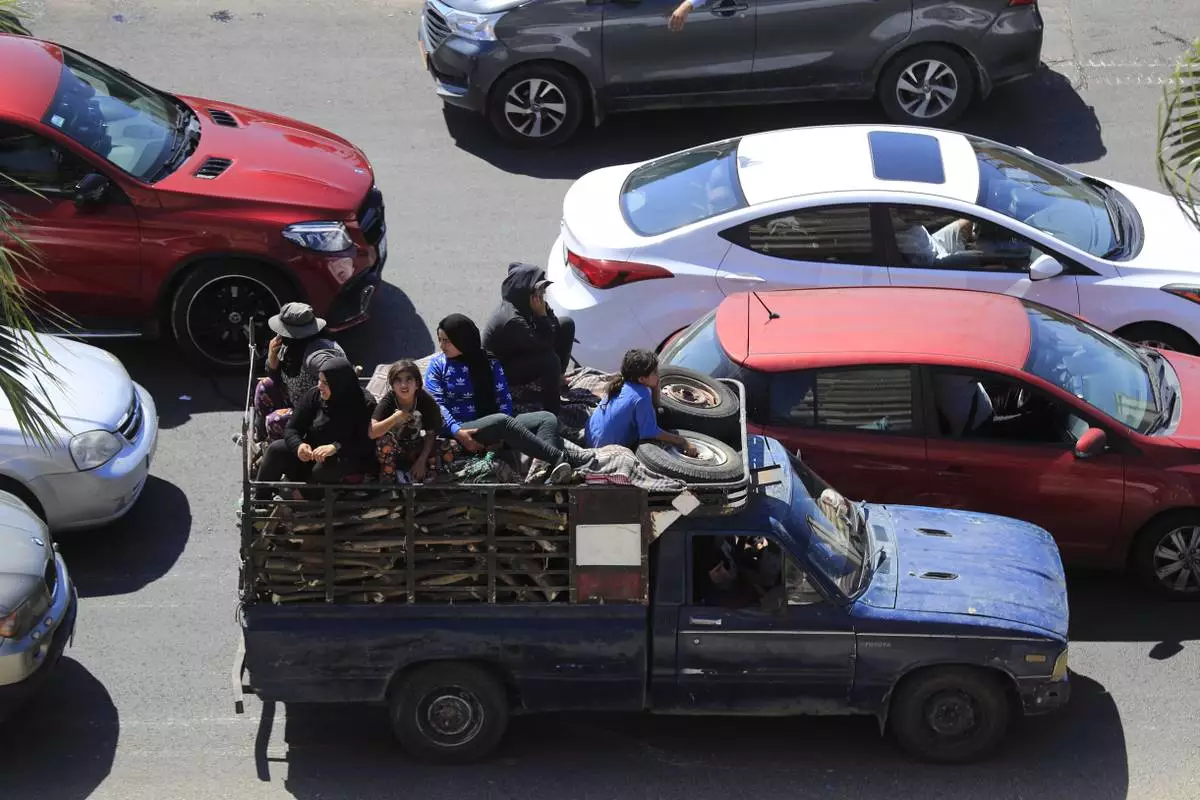
Cars sit in traffic as people flee the southern villages amid ongoing Israeli airstrikes, in Sidon, Lebanon, Monday, Sept. 23, 2024. (AP Photo/Mohammed Zaatari)
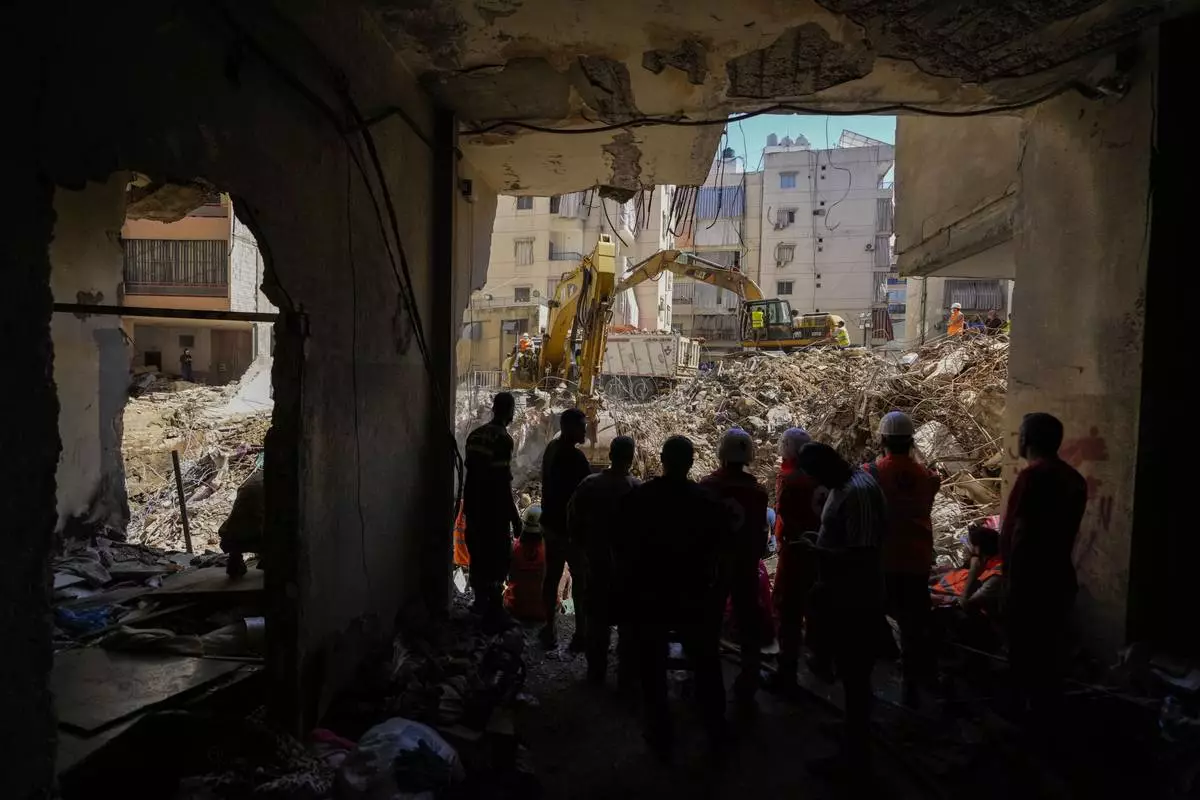
Emergency workers use excavators to clear the rubble at the site of Friday's Israeli strike in Beirut's southern suburbs, Lebanon, Monday, Sept. 23, 2024. (AP Photo/Hassan Ammar)
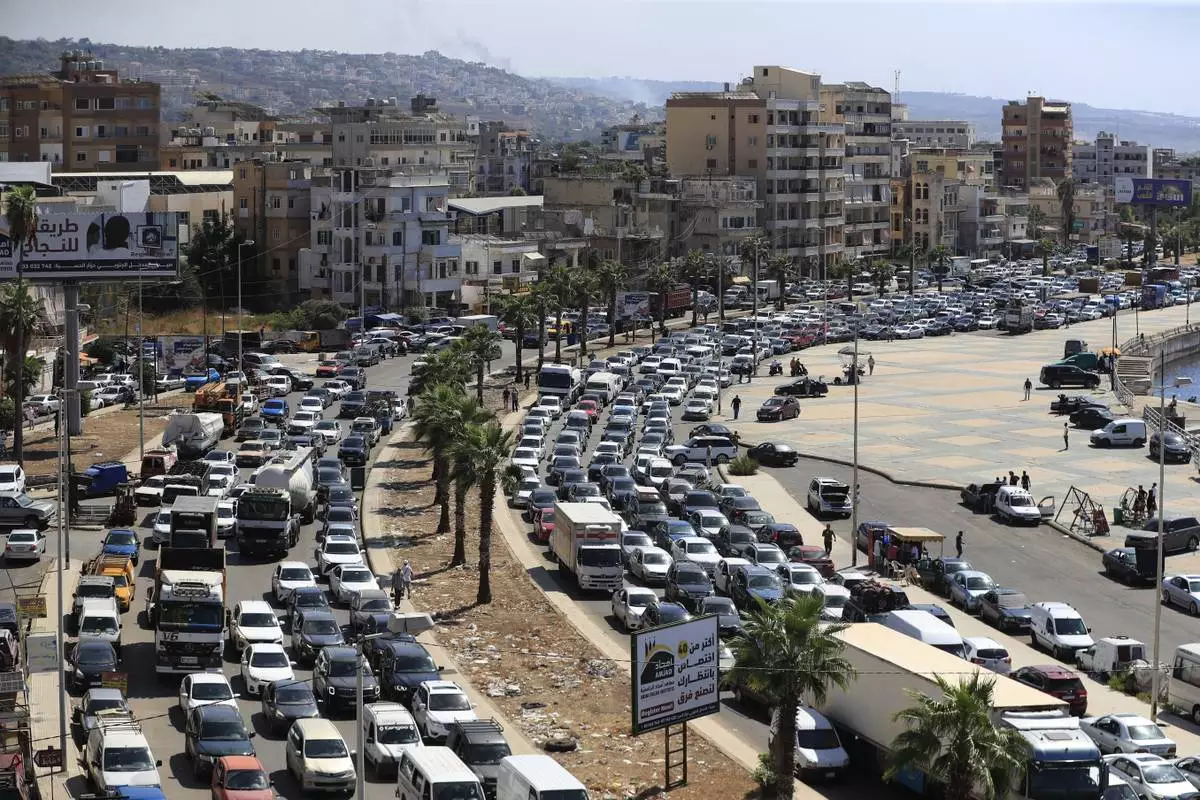
Cars sit in traffic as they flee the southern villages amid ongoing Israeli airstrikes, in Sidon, Lebanon, Monday, Sept. 23, 2024. (AP Photo/Mohammed Zaatari)
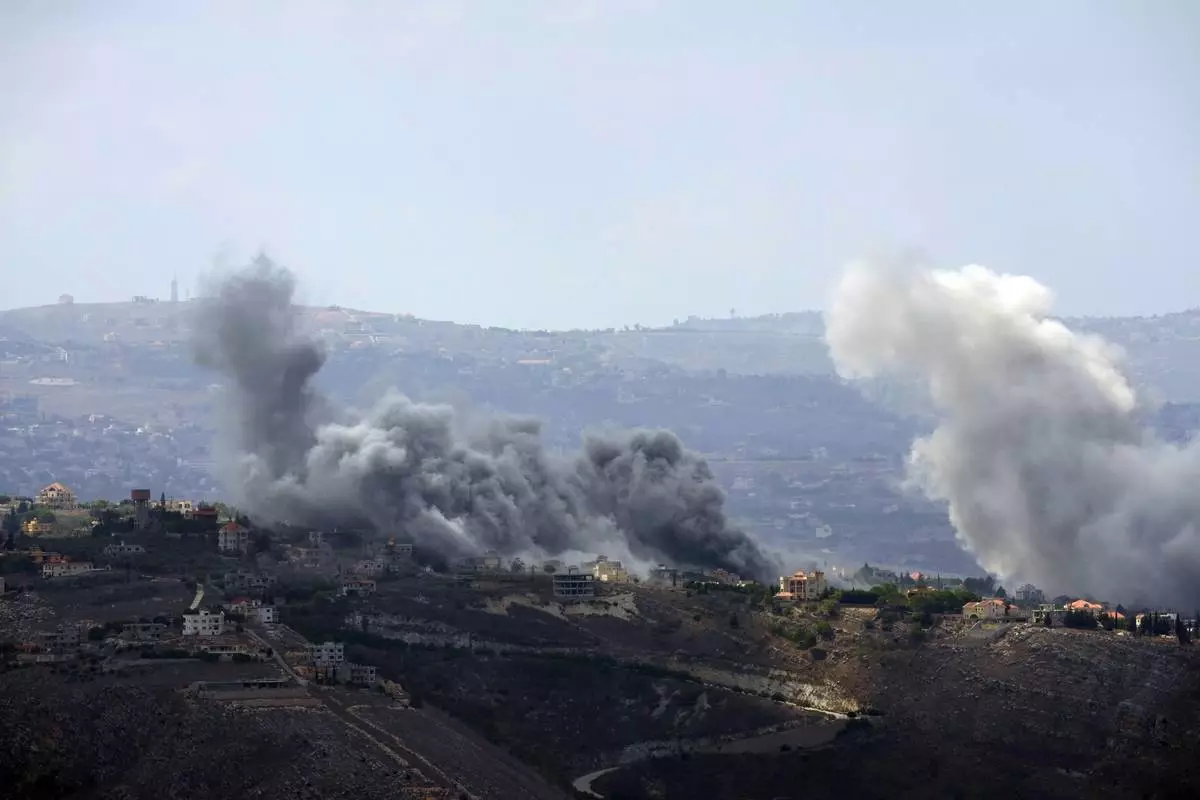
Smoke rises from Israeli airstrikes on Taybeh village, seen from the southern town of Marjayoun, Lebanon, Monday, Sept. 23, 2024. (AP Photo/Hussein Malla)
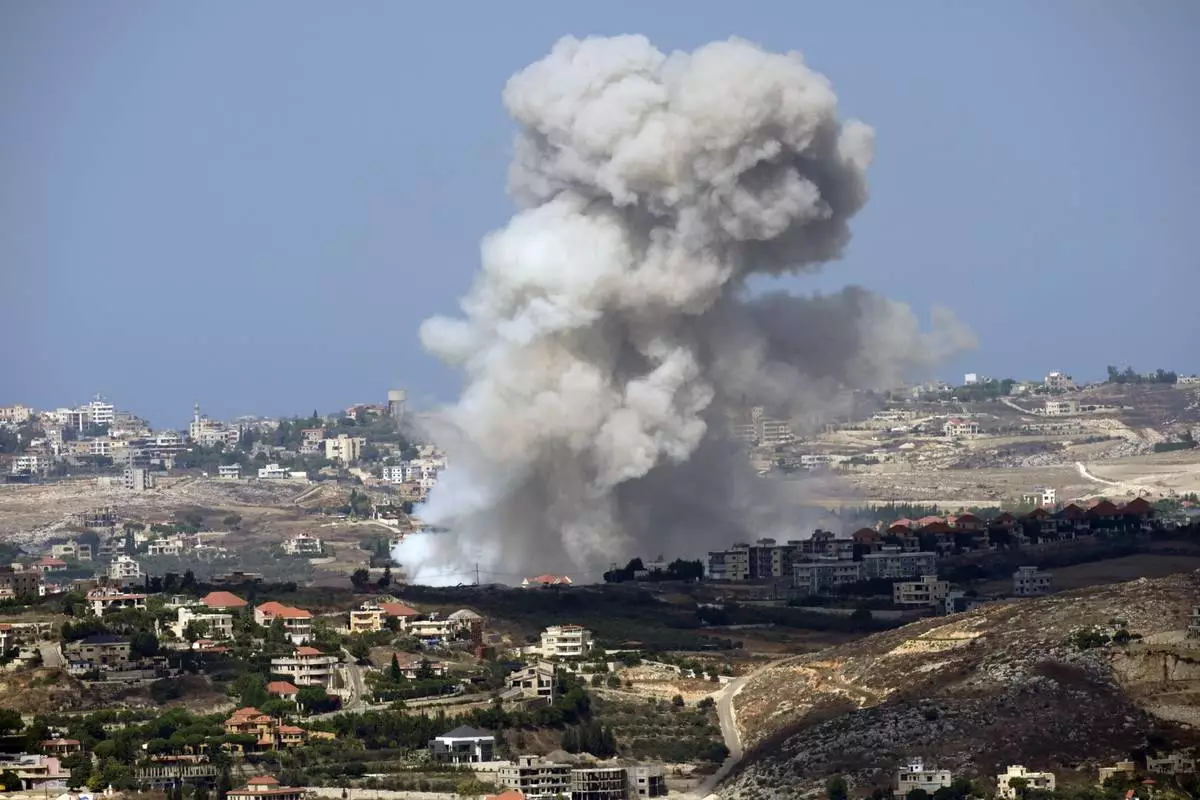
Smoke rises from Israeli shelling on villages in the Nabatiyeh district, seen from the southern town of Marjayoun, Lebanon, Monday, Sept. 23, 2024. (AP Photo/Hussein Malla)
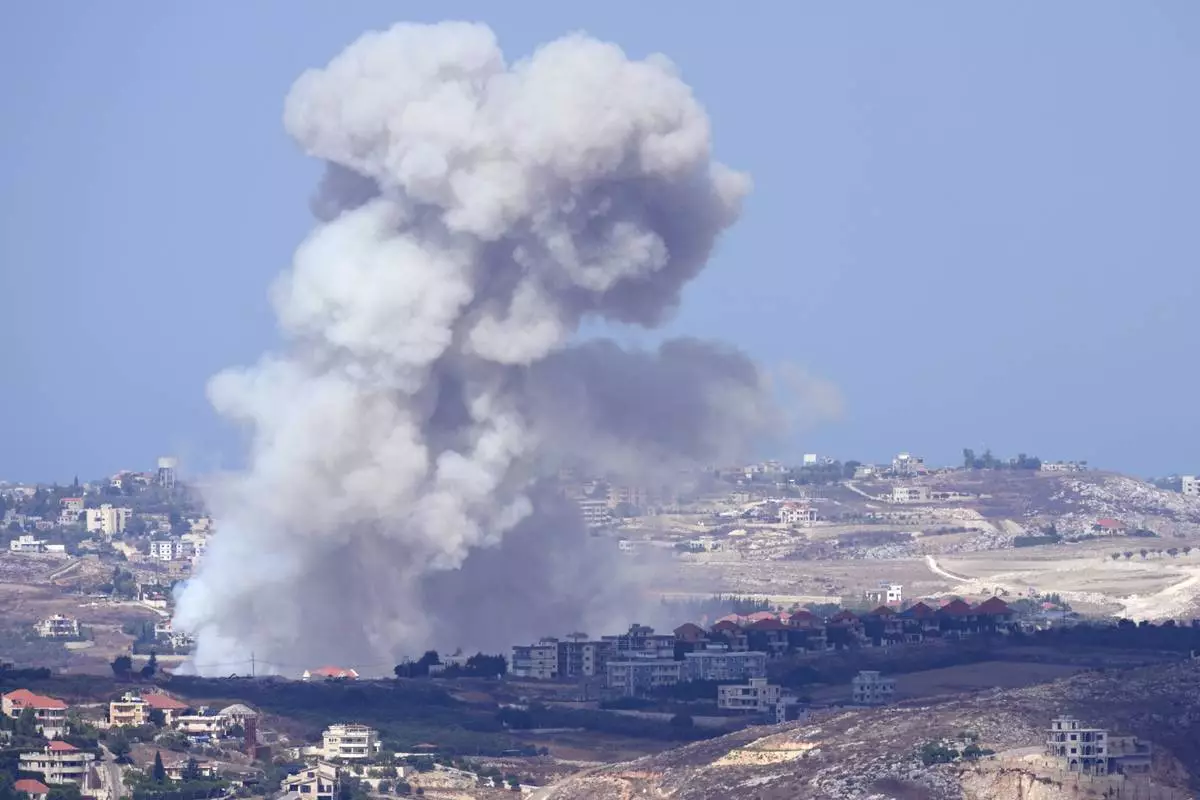
Smoke rises from Israeli airstrikes on villages in the Nabatiyeh district, seen from the southern town of Marjayoun, Lebanon, Monday, Sept. 23, 2024.(AP Photo/Hussein Malla)
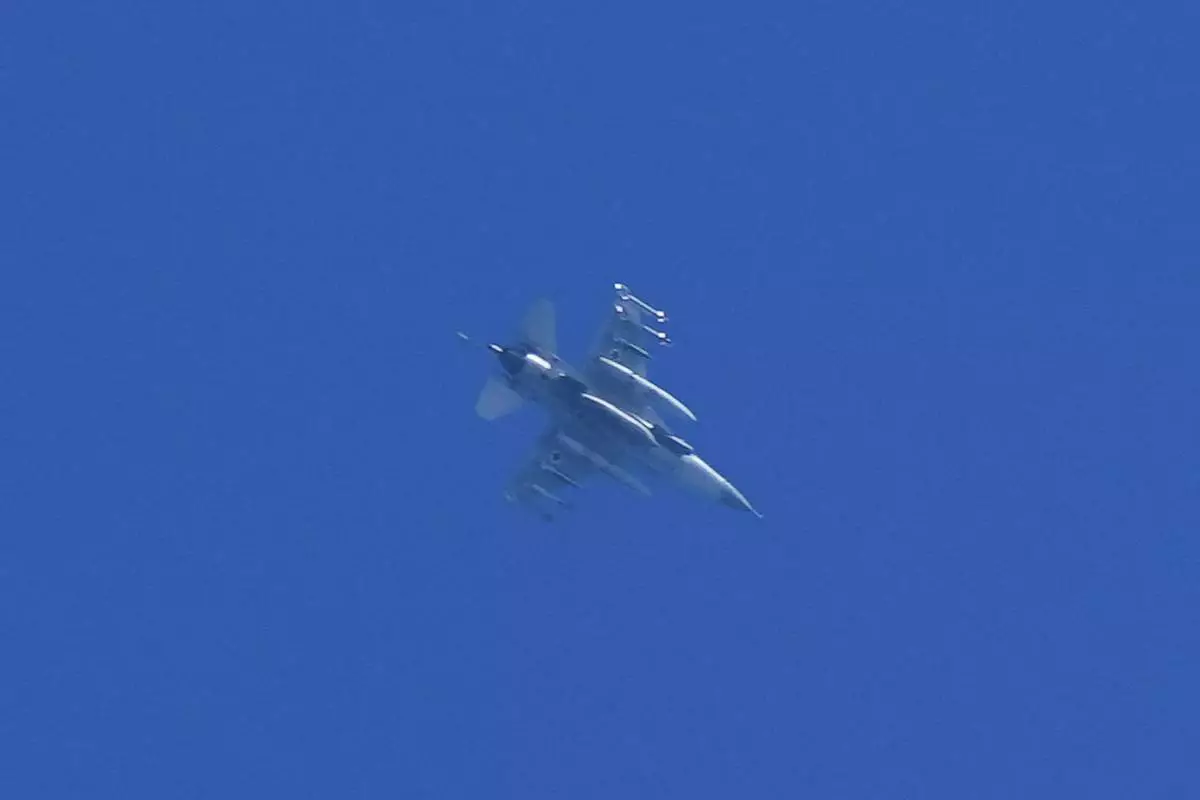
An armed Israeli fighter jet is seen from Haifa, northern Israel, on Monday, Sept. 23, 2024. (AP Photo/Baz Ratner)
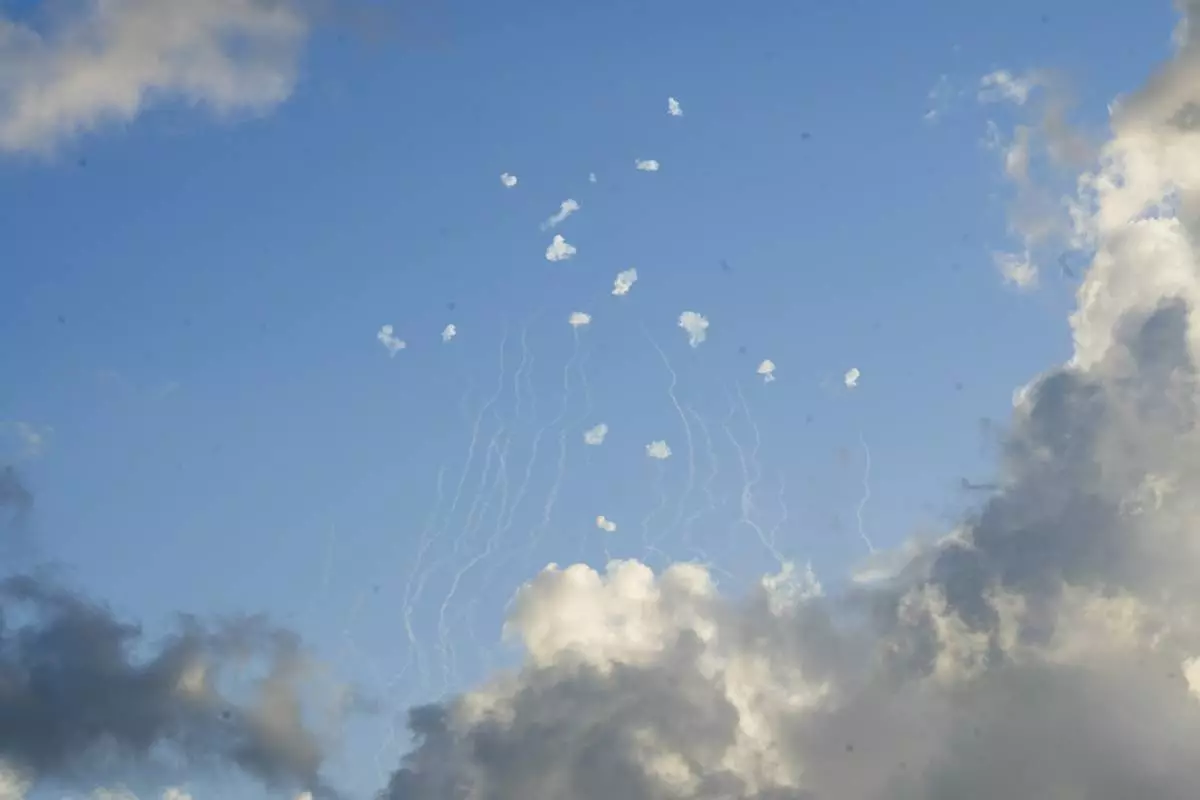
Israeli Iron Dome air defense system fires to intercept rockets that were launched from Lebanon, in northern Israel, Sunday, Sept. 22, 2024. (AP Photo/Baz Ratner)
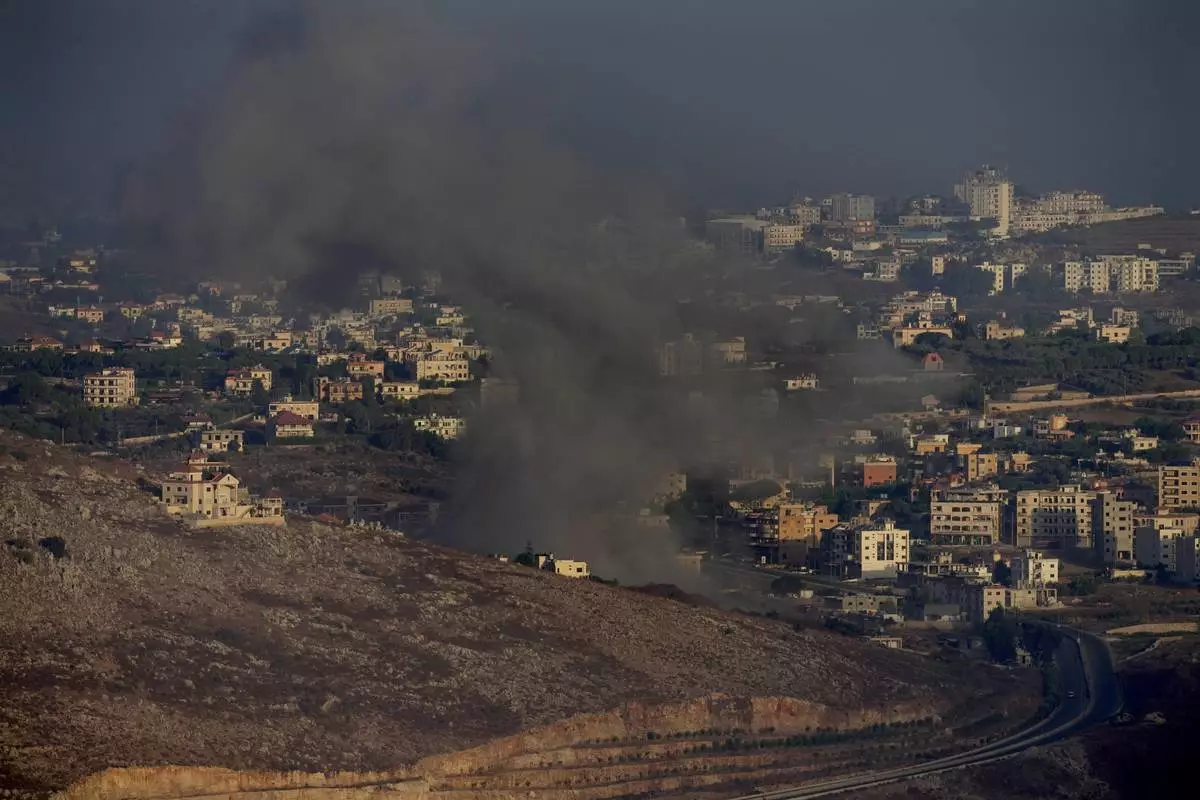
Smoke rises from an Israeli airstrike on Kfar Rouman village, as seen from Marjayoun town, south Lebanon, Monday, Sept. 23, 2024. (AP Photo/Hussein Malla)
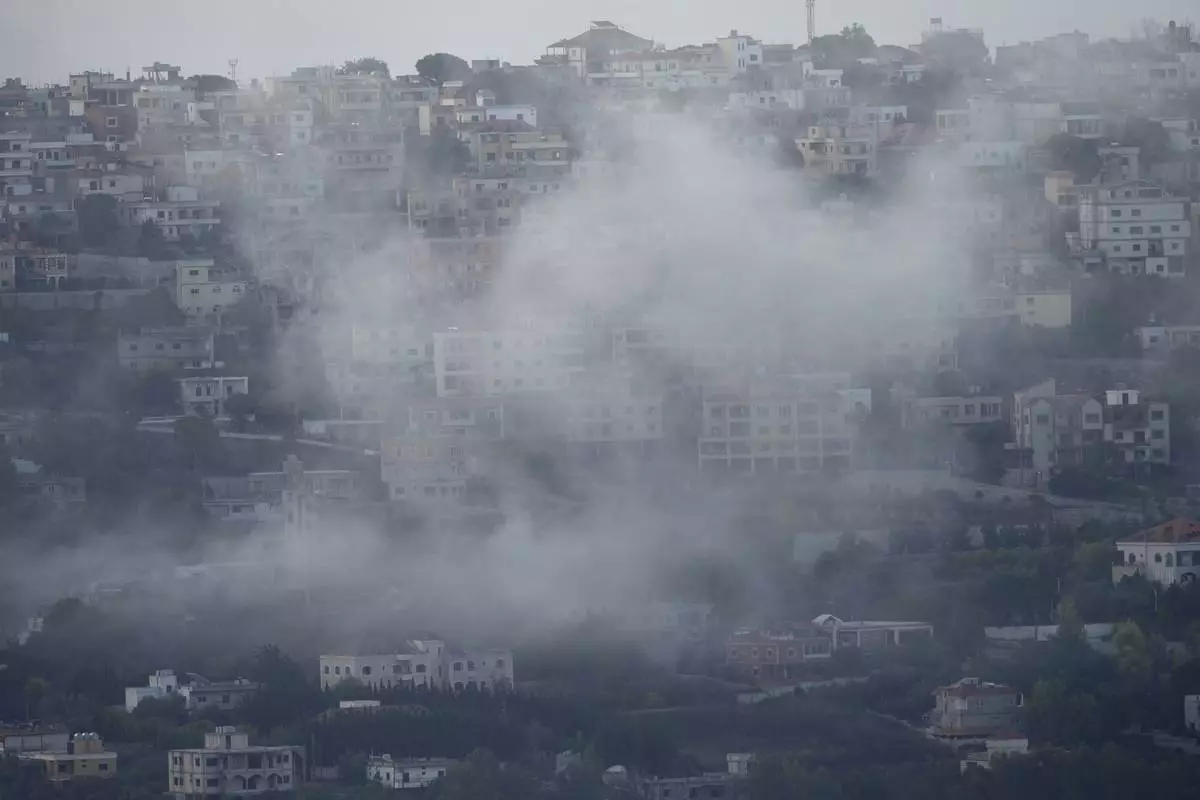
Smoke rises from an Israeli airstrike on Khiam village, as seen from Marjayoun town, south Lebanon, Monday, Sept. 23, 2024. (AP Photo/Hussein Malla)
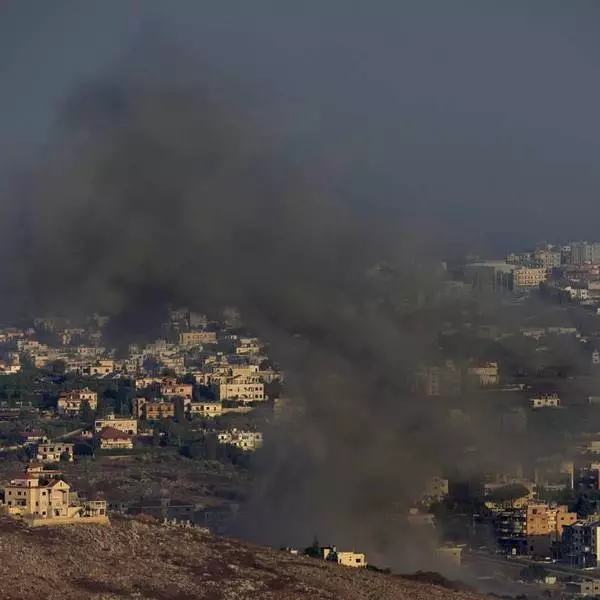
Israel calls on Lebanese to leave homes where Hezbollah stores arms as warplanes launch new strikes
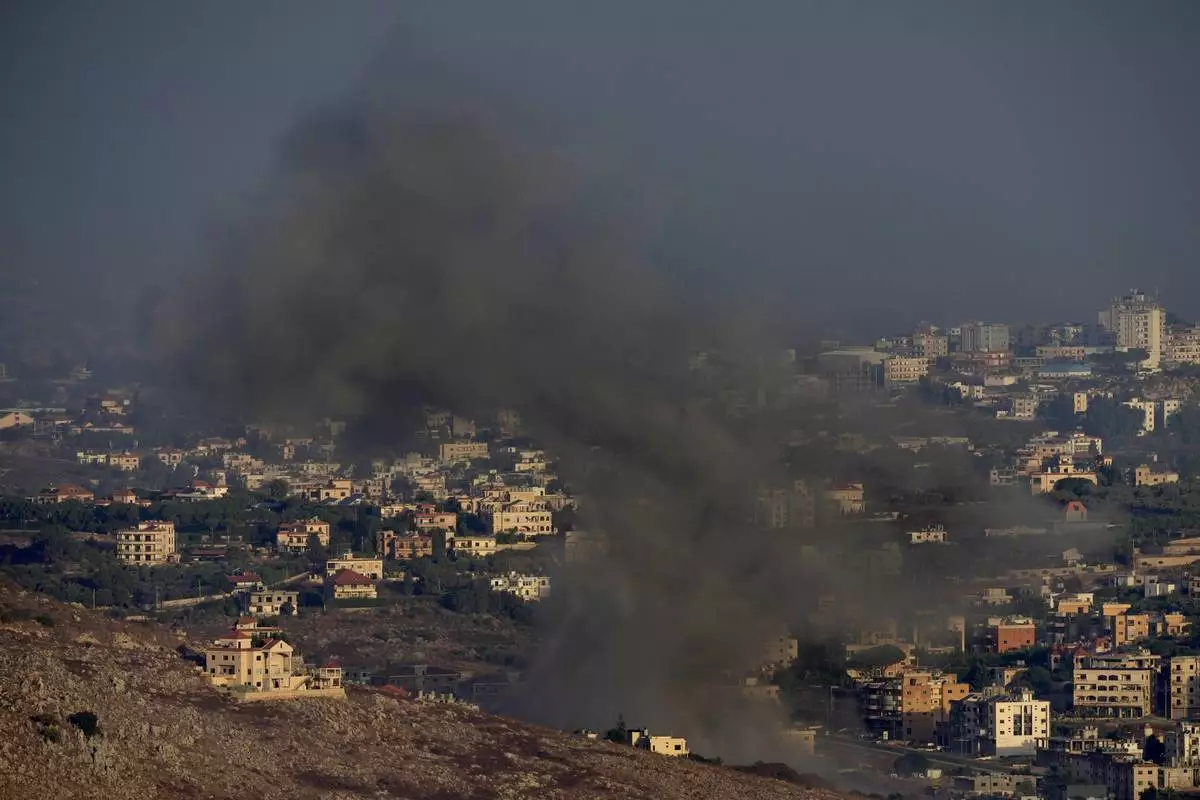
Smoke rises from an Israeli airstrike on Kfar Rouman village, as seen from Marjayoun town, south Lebanon, Monday, Sept. 23, 2024. (AP Photo/Hussein Malla)
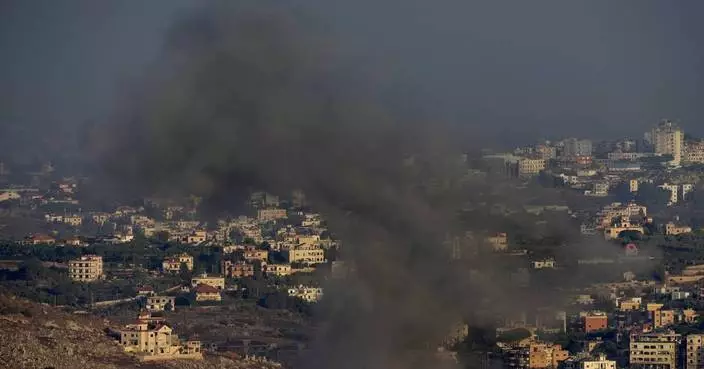
Israel calls on Lebanese to leave homes where Hezbollah stores arms as warplanes launch new strikes





